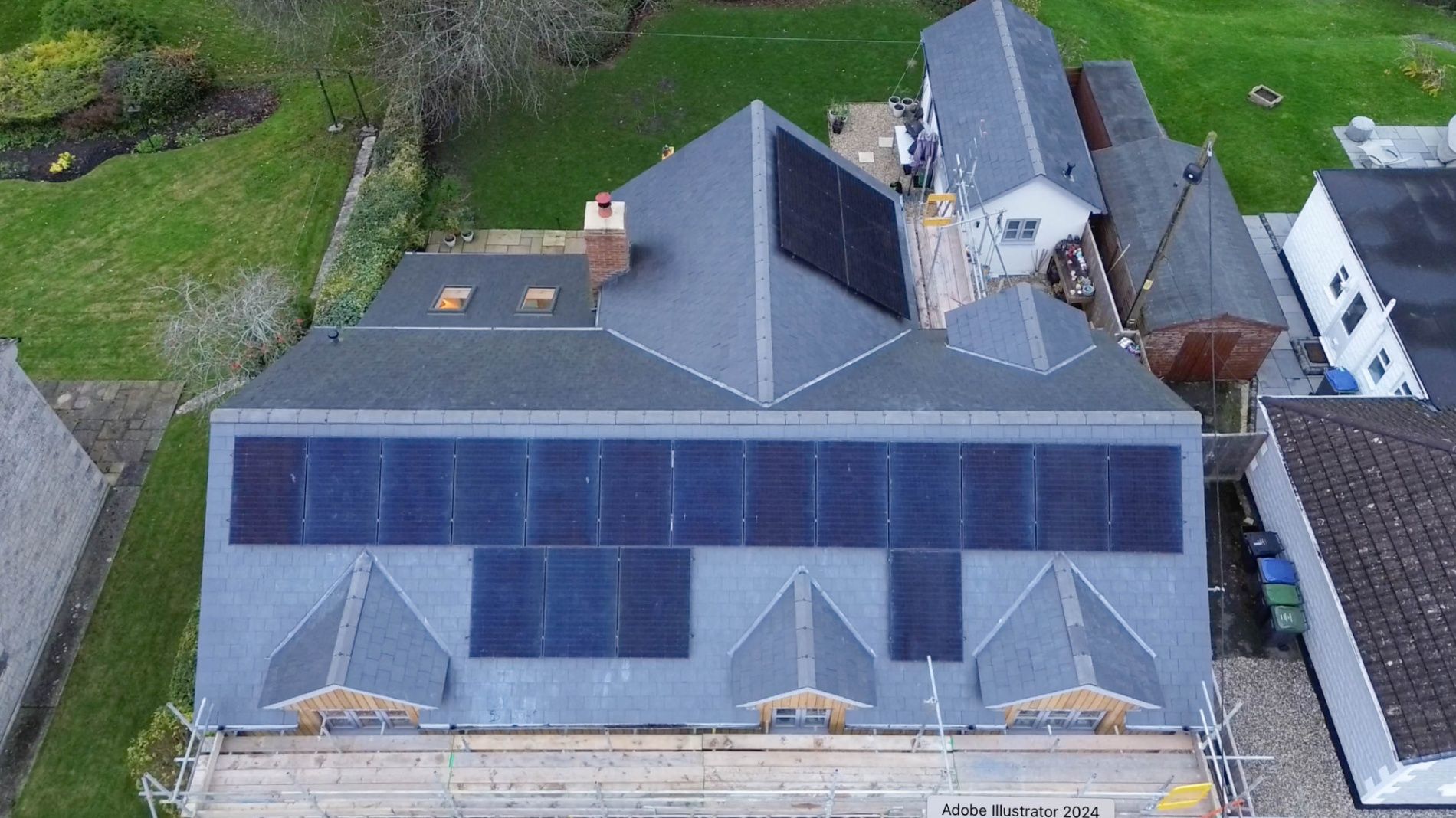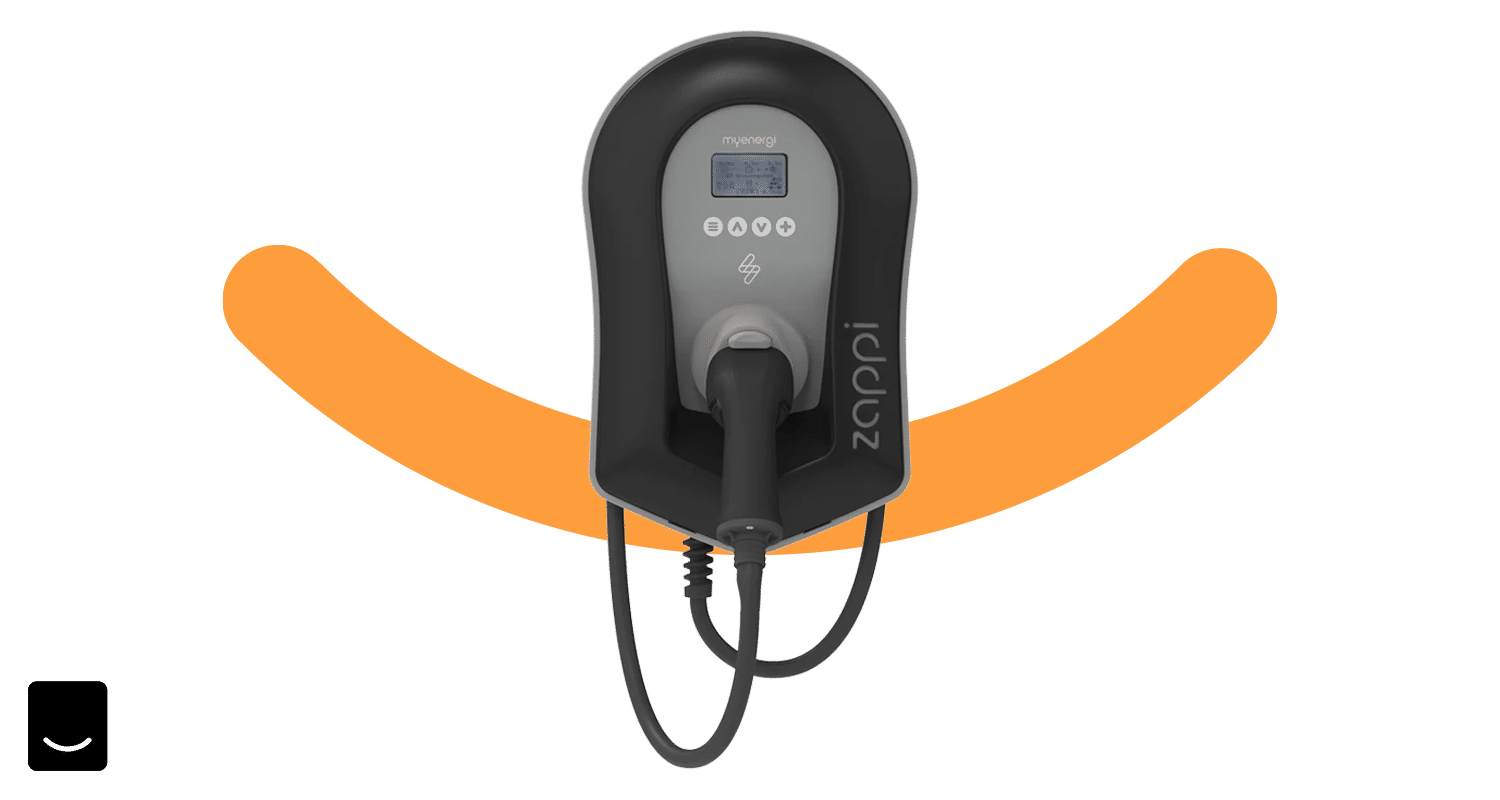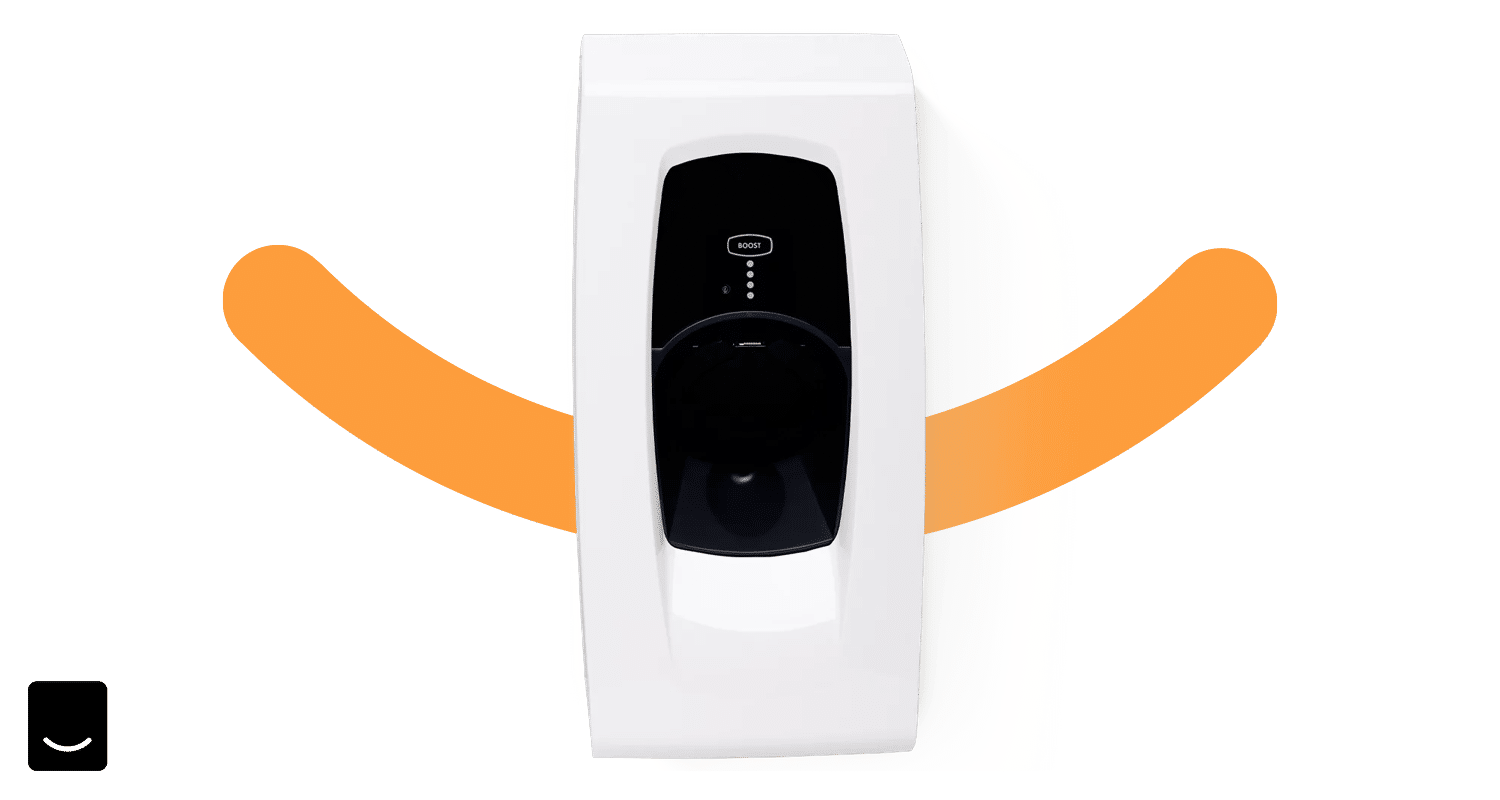Wanna plug your car into the sun? Here's how to charge your EV from solar.
- How Do Solar Panels Work with Car Charging?
- How to Charge an EV with Solar Energy
- How many solar panels do you need to charge a car?
- Can you use any type of EV charger with solar panels?
- Which EV charger will charge your car the fastest?
- Best Solar Compatible Electric Car Chargers
- Advantages and Disadvantages of Charging an EV with Solar Power
- The Future of Solar and Electric Cars
There are more than half a million electric vehicles (EVs) on UK roads and those numbers are expected to grow.
One of the major goals of the country going electric is to reduce our carbon emissions.
Yet, electricity isn't always generated from carbon-free sources, that is unless you use solar energy (or your car is powered by a windmill).
But what is involved?
Here we explain what you'll need, what you can expect and important considerations...
PS We offer MCS-certified solar panel installation nationwide. Simply answer these questions, get your fixed price and arrange your free design.
Solar Panel Car Charging Key Points:
Solar panels can charge electric cars using a free, renewable and carbon-free form of energy.
You will require a solar panel system and a solar car charger.
The battery size and solar panel system size you require depends on the size of your roof, how much domestic energy you use and the size of your car battery.
Optional solar battery systems can improve the usable energy from your solar system.
Various incentives and government programs exist to encourage the adoption of solar-powered electric vehicle charging.
It's advisable to consult with a solar energy expert or installer to assess your specific situation and determine the best solar charging solution for your electric car.
Charging your electric car with solar power makes you so green, it’s best to keep an eye on your skin pigmentation.
We have also reviewed the best EV chargers and the best solar panels and covered how long solar panels last in the UK.
How Do Solar Panels Work with Car Charging?
Solar panels or solar modules are typically installed onto the roof of your home, which convert sunlight energy into electricity you can use to power your home and/or sell the excess back to the National Grid using the Smart Export Guarantee (SEG). Installing them on the inside of your roof is not advisable.
This is a remarkable feat since this energy is essentially free, renewable and emits zero carbon. In other words, it fixes most things that are wrong with energy, including your bill.
This energy can also be sent to your electric vehicle charger to charge your electric car/vehicle, enabling you to reduce your carbon footprint and make further energy and financial savings.
How to Charge an EV with Solar Energy
In general, in order to charge your electric vehicle with solar energy, you will need the following:
A solar panel system - which is typically installed on your roof.
Solar charger for your car battery.
An electric vehicle.
You may or may not want to use a solar battery for energy storage - some cheaper solar battery systems have low charge and discharge rates, meaning you may be limited on how much power can be transferred at once – see our review of battery systems here.
On the one hand, you could simply charge your car during daylight when your solar panels are actively capturing sunlight.
However, if you use a solar battery, energy can be stored allowing you to charge your EV overnight or in the evening, which is more convenient for those that will be working away from home during the day. It’s a frustrating dilemma: leaving for work or staying home to charge your car.
Got battery storage? You'll be able to charge your car overnight, or when it's dark for more ominous reasons.
The average domestic solar PV system can generate one to four kilowatts of energy (kWp).
This is typically adequate to charge an electric car with a battery capacity of 40 kWh in around eight hours.
Please note that this does depend on factors like weather conditions and season. As you can imagine, solar power works best in sunlight.
For example, during winter, you may need to supplement your car charging by drawing more energy from the National Grid.
Still, learning about solar? Check out our guides on how many solar panels you need and how solar car charging works.
How many solar panels do you need to charge a car?
If you only want to use your solar array to charge your electric vehicle, then you can size your system accordingly, based on the size of your roof and the car battery. In most cases, bigger cars come with bigger houses and bigger roofs, which is a convenient correlation.
However, the majority of homeowners install PV to combat energy costs for their homes.
If you use the power from your PV system to power your home then not all the power from the solar panels can be used to charge your car.
Smart solar chargers can help manage the energy demands of both your home and your EV.
We suggest seeking the help and advice of a solar expert, so they can help you design a system specifically to meet your goals.
Explore a Solar Case Study: Check out an insightful Q&A session featured in one of our detailed case studies on domestic solar panels. Hear directly from a Heatable customer in the UK and gain valuable perspectives on their experience here.

The image above shows a 23-panel solar installation, carried out by the MCS-certified solar team at Heatable, featuring the REA Fusion2 solar panels.
Can you use any type of EV charger with solar panels?
Solar power is created as DC current, whilst EV cars use DC current to store battery power they usually only accept AC current to charge (some specialist high power, high voltage chargers do use DC but these are not available for domestic use but if Batman is reading this, perhaps it applies).
All UK solar systems have to convert DC power to usable AC power for our homes, therefore, you can technically use any car charger with your solar PV system.
However, solar-specific chargers have some inbuilt technology that only takes the surplus energy your home does not consume and then allows it to flow into your car (so you don’t export to the grid). This means your car gets less energy when your wife is using the dryer.
No solar-specific smart chargers will just charge your car whether or not your solar PV system is producing power or not.
Which EV charger will charge your car the fastest?
The Hypervolt Home 3 Pro offers a single-phase charging speed of up to 7.4kW, making it one of the fastest home EV charging stations on the market.
Best Solar Compatible Electric Car Chargers
Before discussing our favourite solar-compatible EV chargers, we should discuss the OZEV grant (a.k.a. Office for Zero Emission Vehicles Grant).
This grant provides a discount of up to £350 off the total cost of having a home charging point installed, so long as it is zero carbon. As in golf, the goal with carbon is to get as close to zero as possible. Only there are no birdies.
Therefore, when looking at the prices above, you should consider that the OZEV grant could reduce these figures by several hundred pounds if you were to make a purchase.
HyperVolt Home Pro 3 (Best)

The Hypervolt Home Pro 3 is a top-tier EV charger for UK homeowners seeking efficiency and innovation.
Key details:
Single-Phase Charging Speed: 7kW – Charges up to 20-25 miles per hour (e.g., full charge for a Tesla Model 3 in ~8-10 hours).
Type: Tethered, with a 5m cable (7.5m optional).
Approximate Cost: £900–£1,200.
Warranty Period: 3 years.
Standout Features:
Smart Connectivity: 4G and Wi-Fi enabled, plus Alexa voice control (e.g., “Alexa, start charging”).
Adjustable Lighting: Customise LED lights for practicality or ambience.
Safety: Built-in PEN fault protection eliminates the need for an earth rod, reducing electric shock risk.
Charging Modes:
Schedule Charge: Set times to match off-peak tariffs or solar use (e.g., midnight to 6 AM).
Plug and Charge: Starts charging instantly when plugged in.
The Hypervolt app offers a user-friendly interface for monitoring usage, setting schedules, and remote control—among the best available.
Considerations:
Tethered Only: No untethered option; 5m (or 7.5m) cable is fixed.
Size: Relatively large (approx. 12-15” tall, 8-10” wide)—ensure wall space.
Cost: Premium price, though justified by features.
Who It’s For:
Ideal for tech-savvy EV owners with solar setups or those wanting safety and flexibility, backed by a 3-year warranty.
Zappi Home Energy Charger
Myenergi, the brand behind the Zappi EV charger, is one of the leading brands in the sector. It has a charging speed of 7kW and costs around £1,000 to £1,200.

You can use remote access for this home charger with the myenergi app. It is suitable for both indoor and outdoor mounting.
Myenergi offers a three-year warranty with the Zappi Home Energy Charger. As for its protection degree, it stands at IP65, making it weatherproof.
Tesla Wall Connector
Key details:
Single-phase Charging Speed: Up to 7.7kW (32 amps).
Three-phase Charging Speed: Up to 22kW (region-dependent).
Type: Tethered (up to 7.3m/24ft cable).
Approximate Cost: £500 to £700 (excluding installation).
Warranty period: 4 years (residential use).
The Tesla Wall Connector comes from, well, Tesla—the name that’s practically synonymous with electric vehicles. It’s a premium choice for UK EV owners, especially those already in the Tesla ecosystem.
Starting with the charging speed, this sleek unit delivers up to 7.7kW on a single-phase connection, perfect for most UK homes. If you’ve got three-phase power (and live somewhere it’s supported), it can ramp up to an impressive 22kW. Actual speeds depend on your car and setup, but rest assured—it’s fast. Just don’t expect it to turbocharge your driving skills.
This Wi-Fi-enabled charger is all about simplicity and power. It’s tethered with a generous 7.3-meter cable that’s easy to coil around its minimalist frame—think of it as a high-tech cable tidy. You can tweak settings via the Tesla app, scheduling charges for off-peak rates or syncing with solar if you’ve got a Powerwall. Choose between a steady charge or max power mode when you’re in a hurry—say, racing off to a last-minute meeting (or a futuristic getaway).
Built for indoor or outdoor use, it boasts an IP55 rating, meaning it’ll shrug off rain and dust—though it won’t survive a biblical flood. The 4-year warranty is a nice touch, outpacing many rivals.
Last but not least, the Tesla app ties it all together. It’s not going to win awards for pizzazz, but it’s slick, functional, and lets you monitor your charge from anywhere. Non-Tesla owners can use it too with an adapter, but it’s undeniably optimised for the Tesla crowd.
Alpha ESS EV Charger
The Alpha ESS EV charger can work as a standalone charger but is compatible with the Alpha ESS battery storage system.
However, it’s worth noting that there is a major advantage to having an EV battery and charger from the same company - that being the fact you can prevent the EV charger from using stored energy and instead use excess energy generation from your solar system.
The unit also comes equipped with a 5-metre-long charging cable and access authorisation, which allows you to prevent unauthorised use of the charger via the Alpa app. This is especially useful if your charger is in an open space where other people may be able to access your unit.
Prefer video? Watch our YouTube review of the Alpha ESS EV charger below:
Indra Smart Pro
For a slightly faster option, consider the Indra Smart Pro, which offers a 7.4kW charging speed.

Not only that but it costs approximately £800 to £1,100, making it a bit cheaper too. Faster and cheaper sounds like a scam, but we promise it’s not.
It offers advantages such as smart scheduling, solar matching, and off-peak charging. By using tariff integration, you can even set kilowatt-hour price caps.
The Indra Smart Pro comes with a three-year warranty as standard. All in all, this is another solid solar-compatible EV charger.
Advantages and Disadvantages of Charging an EV with Solar Power
If you’re still on the fence as to whether you should charge your EV with solar power, here is a summary of the major pros and cons of using solar energy to charge your EV:
Pros:
The OZEV grant can reduce how much you’d need to spend on having a solar-compatible EV charger installed.
Can reduce your energy bill as you’d be using energy you generate on your property. Moreover, you could potentially sell excess solar energy back to the grid.
Fast and convenient charging without the need to go looking for a charging station elsewhere. It will be right where you installed it.
With a solar battery, you could even charge overnight.
Can increase the value of your property, especially with EV use likely to soar in the coming years and decades.
Cons:
Even with the OZEV grant, you’d still be spending a good bit of cash.
Solar energy is generally not as reliable as taking electricity straight from the grid.
It’s a lot of time and money to invest in solar and EV charging infrastructure, so you should only do so if you’re sure this is for you.
The Future of Solar and Electric Cars
We touched on our optimism for solar power and electric cars in the previous section and this is for good reason.
The UK is expected to see double or treble its current solar power use by 2030.
Not only that but the UK government is even thinking about building a £16 billion space-based solar power station at some point in the coming decades.
Whatever the future holds, it certainly looks like solar will play a significant role in the future of the UK’s energy needs through the remainder of the 21st century.
As for EVs, we are likely to have millions, if not tens of millions on UK roads by the early to mid-2030s. It will be the decade of clean traffic jams.
With the UK government eyeing Net Zero by 2050 and with plans for a ban on newly produced gas cars for 2035, the future for EVs looks even more exciting when considering just the next 10-15 years alone.
If you want to get a foothold early on, you should consider charging your EV with solar power.
If you are researching solar panel companies, you may find our resources valuable. Check out our comprehensive comparison of the best solar panel companies in the UK, learn about the Distribution Network Operator (DNO) process, and explore our detailed solar panel guide and solar advice section for expert insights and recommendations.
Next Steps For Your Solar Journey:
When planning to install solar panels for your home, there are several important factors to consider. Make sure to refer to the following guides to help you make informed decisions:
To dive deeper into these topics, head over to our advice section, check out our YouTube channel for informative videos, or read a customer case study to see how others have benefited from their solar installation.
Get a Quote for Solar Today
Without boasting you should get your solar installed with us, here's why:
Thousands of Happy Customers: We boast an average score of 4.9 on Trustpilot, outperforming the market leader.
Which? Trusted Trader: Heatable is proudly recognised as a Which? Trusted Trader.
MCS Accredited: Our accreditation by the Microgeneration Certification Scheme (MCS) ensures high-quality standards.
Exclusive Panels: We offer REA Fusion solar panels, available only through Heatable.
Consumer Protection: As members of the HIES consumer code, we provide 2-year deposit protection.
Flexible Payment Options: Choose from multiple payment methods, including finance options.
Fixed Price Guarantee: Enjoy transparency with no hidden costs.
Save Your Quote: You can save your quote and decide later.
Bespoke Design Tool: Draw your own conclusion (literally) on whether solar is worth it for you, here.






